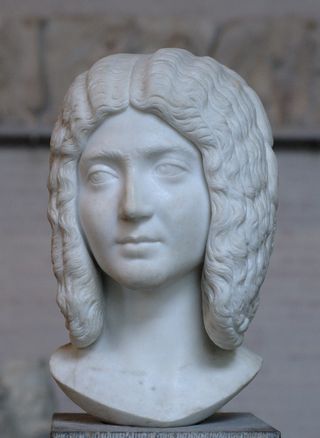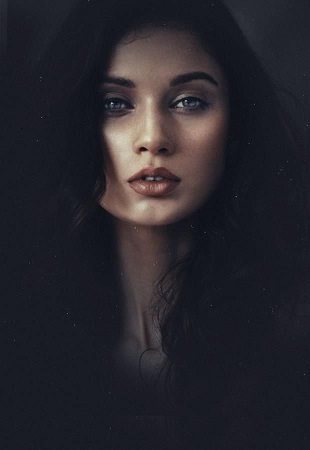Empress Julia Domna: Difference between revisions
| Line 12: | Line 12: | ||
<span style="color:#000000;">'''Sobriquet:''' Julia. Empress. Augusta. Mater Castrorum (mother of the camp). | <span style="color:#000000;">'''Sobriquet:''' Julia. Empress. Augusta. Mater Castrorum (mother of the camp). | ||
<span style="color:#000000;">'''Appearance:''' Julia Domna is a woman of slight stature, weighing no more than one hundred pounds and five-foot-three inches tall. She has a swarthy complexion that quickly darkens with exposure to the sun. Her hair is long, hanging to the blades of her shoulders and naturally dark, but without dye it is shot with gray streaks; as a general rule, the empress does keep her hair dyed dark which easily takes ten years away from her countenance. Julia's face is one of classical middle-eastern beauty, but she has dark gray eyes, like crystallized iron and an ageless beauty that suggests both severity and suffering. These two traits combined with her slim, some would say waif-like body, causes an almost instantaneous infatuation in both sexes of which Julia seems to be unconscious. At other times, the Augusta obviously and consciously uses her beauty to great and specific effect, though it does not seem to give her any personal pleasure. The mother of the ancient Roman legions, prefers to garb herself the clothing of whatever age she awakens into, but she wears modern clothing with restrained | <span style="color:#000000;">'''Appearance:''' Julia Domna is a woman of slight stature, weighing no more than one hundred pounds and five-foot-three inches tall. She has a swarthy complexion that quickly darkens with exposure to the sun. Her hair is long, hanging to the blades of her shoulders and naturally dark, but without dye it is shot with gray streaks; as a general rule, the empress does keep her hair dyed dark which easily takes ten years away from her countenance. Julia's face is one of classical middle-eastern beauty, but she has dark gray eyes, like crystallized iron and an ageless beauty that suggests both severity and suffering. These two traits combined with her slim, some would say waif-like body, causes an almost instantaneous infatuation in both sexes of which Julia seems to be unconscious. At other times, the Augusta obviously and consciously uses her beauty to great and specific effect, though it does not seem to give her any personal pleasure. The mother of the ancient Roman legions, prefers to garb herself the clothing of whatever age she awakens into, but she wears modern clothing with a restrained classical style that always sets her apart from the mortals she associates with. As she has every right to do so, Julia always wears some article of cloth stained with the royal purple and jewelry bearing amethysts. With the proper cosmetics and the right attire, the empress can pass herself off as woman ten to fifteen years younger than her nearly five decades would suggest. Alternately, when she wishes to avoid attention, at least of a carnal nature, she can use artifice to age herself a good twenty years and become a matronly grandmother of nearly seventy years. | ||
<span style="color:#000000;">'''Behavior:''' What words can best be conjured to describe an immortal empress nearly two thousand years old? The first would be reserved, as Julia Domna holds the world at bay with a calm that is centuries deep. Intelligent would be another word, but genius would better describe her brilliant wit and encyclopaedic familiarity with nearly all forms of intellectual pursuit known to humanity thus far. Sardonic might also be apt, for she has seen nearly every variation of human failing since her first life and its clear in the metallic prisms of her eyes that she is more than a bit jaded with ennui. And of course, sad, for she bears a wistful air that seems to ward off the youthful and the lighthearted, but which grants her a grim dignity that calls out to those who have themselves known tragedy, and draws such kindred spirits to her like moths to a flame. | <span style="color:#000000;">'''Behavior:''' What words can best be conjured to describe an immortal empress nearly two thousand years old? The first would be reserved, as Julia Domna holds the world at bay with a calm that is centuries deep. Intelligent would be another word, but genius would better describe her brilliant wit and encyclopaedic familiarity with nearly all forms of intellectual pursuit known to humanity thus far. Sardonic might also be apt, for she has seen nearly every variation of human failing since her first life and its clear in the metallic prisms of her eyes that she is more than a bit jaded with ennui. And of course, sad, for she bears a wistful air that seems to ward off the youthful and the lighthearted, but which grants her a grim dignity that calls out to those who have themselves known tragedy, and draws such kindred spirits to her like moths to a flame. | ||
Revision as of 00:14, 8 November 2014
- Story 29 - Bellum Horarium -x- Cabiri -x- Beirut
The Early 3rd Century C.E.
The 21st Century C.E.
The Roman Empress
Epitaph: "Hence no one could, in the light of her career, regard as happy each and all who attain great power, unless some genuine and unalloyed pleasure in life and unmixed and lasting good fortune is theirs. This, then, was the fate of Julia. Her body was brought to Rome and placed in the tomb of Gaius and Lucius. Later, however, both her bones and those of Geta were transferred by her sister Maesa to the precinct of Antoninus."
-- Cassius Dio
Sobriquet: Julia. Empress. Augusta. Mater Castrorum (mother of the camp).
Appearance: Julia Domna is a woman of slight stature, weighing no more than one hundred pounds and five-foot-three inches tall. She has a swarthy complexion that quickly darkens with exposure to the sun. Her hair is long, hanging to the blades of her shoulders and naturally dark, but without dye it is shot with gray streaks; as a general rule, the empress does keep her hair dyed dark which easily takes ten years away from her countenance. Julia's face is one of classical middle-eastern beauty, but she has dark gray eyes, like crystallized iron and an ageless beauty that suggests both severity and suffering. These two traits combined with her slim, some would say waif-like body, causes an almost instantaneous infatuation in both sexes of which Julia seems to be unconscious. At other times, the Augusta obviously and consciously uses her beauty to great and specific effect, though it does not seem to give her any personal pleasure. The mother of the ancient Roman legions, prefers to garb herself the clothing of whatever age she awakens into, but she wears modern clothing with a restrained classical style that always sets her apart from the mortals she associates with. As she has every right to do so, Julia always wears some article of cloth stained with the royal purple and jewelry bearing amethysts. With the proper cosmetics and the right attire, the empress can pass herself off as woman ten to fifteen years younger than her nearly five decades would suggest. Alternately, when she wishes to avoid attention, at least of a carnal nature, she can use artifice to age herself a good twenty years and become a matronly grandmother of nearly seventy years.
Behavior: What words can best be conjured to describe an immortal empress nearly two thousand years old? The first would be reserved, as Julia Domna holds the world at bay with a calm that is centuries deep. Intelligent would be another word, but genius would better describe her brilliant wit and encyclopaedic familiarity with nearly all forms of intellectual pursuit known to humanity thus far. Sardonic might also be apt, for she has seen nearly every variation of human failing since her first life and its clear in the metallic prisms of her eyes that she is more than a bit jaded with ennui. And of course, sad, for she bears a wistful air that seems to ward off the youthful and the lighthearted, but which grants her a grim dignity that calls out to those who have themselves known tragedy, and draws such kindred spirits to her like moths to a flame.
History:
Recent Events:
http://biography.yourdictionary.com/the-julias-of-rome
http://womenandphilosophyproject.blogspot.com/2013/03/julia-domna-philosopher-julia.html
http://link.springer.com/chapter/10.1007/978-94-009-3497-9_8#page-1

